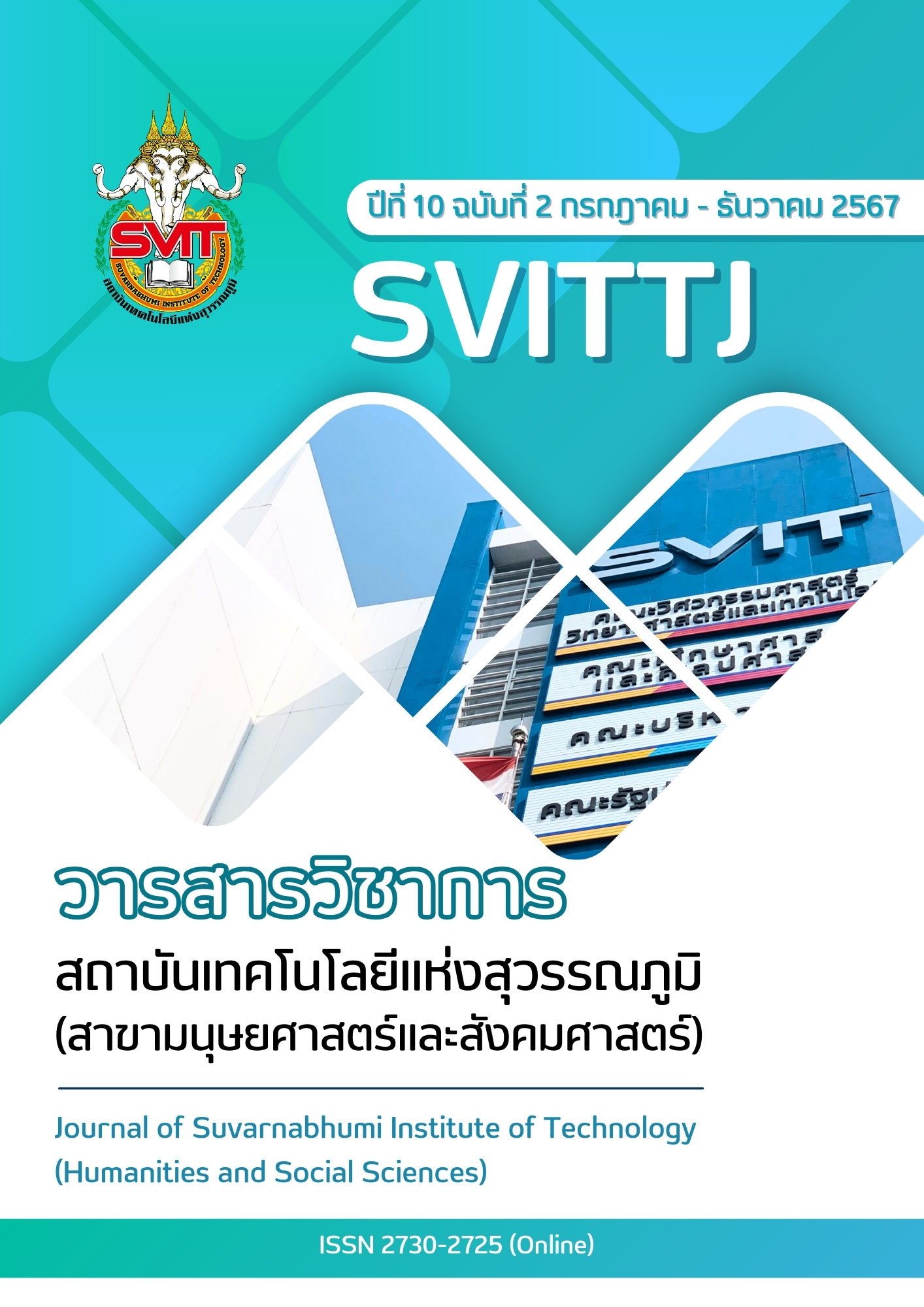THE DEVELOPMENT OF THE ADDITION AND SUBTRACTION SKILLS OF WHOLE NUMBERS LESS THAN 100 USING A GAME SET TO PRACTICE FOR FIRST-GRADE STUDENTS AT PRIVATE ELEMENTARY SCHOOL
Keywords:
Addition and Subtraction Skills, AdditPractice Games, Mathematics AchievementAbstract
This research was Quasi-Experimental design that aimed to 1) compare learning achievement in addition and subtraction numbers of whole numbers less than 100 for first-grade elementary school students before and after the learning intervention using a game set to practice addition and subtraction skills and 2) investigate the satisfaction of first-grade elementary school students regarding learning management using a game set to practice addition and subtraction skills. The samples of the research were 35 Prathomsuksa 1/2 students, Sarasas Witaed Ekkachai School, which were selected through simple random sampling using in the first semester of the academic year 2023. The research tools included 1) a set of practice games, 2) a lesson plan, 3) an achievement test, and 4) a satisfaction questionnaire. The statistics used for data analysis were percentages, mean, standard deviation, and t-test.
The result showed that 1) the learning achievement in addition and subtraction numbers of whole numbers less than 100 for first-grade elementary students after the learning intervention using a game set to practice addition and subtraction skills was statistically significantly higher than before the learning at the .05 significance level. And 2) the overall satisfaction of first-grade elementary students with the learning management using a game set to practice addition and subtraction skills was high level.
Keywords: Addition and Subtraction Skills, Practice Games, Mathematics Achievement
References
กัญญาภัค ธรรมสุข ปวริศา จรดล และภูวดล บัวบางพลู. (2563). การพัฒนาแบบฝึกทักษะการแก้ปัญหาคณิตศาสตร์ เรื่อง การบวก ลบ คูณ หารระคน สำหรับชั้นประถมศึกษาปีที่ 2. วารสารพัฒนาเทคนิคศึกษา, 34(123), 77–83.
จิระประภา คำภาเกะ. (2563). การพัฒนาทักษะการแก้ปัญหาทางคณิตศาสตร์ เรื่องปริซึมและทรงกระบอกโดยใช้เทคนิคเพื่อนคู่คิดร่วมกับเกมคณิตศาสตร์ ของนักเรียนชั้นมัธยมศึกษาปีที่ 2. (วิทยานิพนธ์ปริญญามหาบัณฑิต, มหาวิทยาลัยศิลปากร).
ธนพัฒน์ ทองมา. (2561). แหล่งการเรียนรู้คณิตศาสตร์แบบโมบายเลิร์นนิ่งในยุคดิจิทัล. วารสารครุศาสตร์ จุฬาลงกรณ์มหาวิทยาลัย, 46(1), 251–256.
บุญชม ศรีสะอาด. (2541). การพัฒนาการสอน. กรุงเทพฯ: สุวีริยาสาส์น.
ประภาศิริ ปราโมทย์. (2561). ศึกษาการพัฒนาชุดกิจกรรมการเรียนรู้คณิตศาสตร์ โดยใช้รูปแบบการเรียนรู้แบบร่วมมือควบคู่กับเกม เพื่อส่งเสริมผลการเรียนรู้และคุณลักษณะที่พึงประสงค์ทางคณิตศาสตร์ สำหรับนักเรียนชั้นประถมศึกษาปีที่ 5. (วิทยานิพนธ์ปริญญามหาบัณฑิต, มหาวิทยาลัยราชภัฏเชียงใหม่).
ประมุข จันทวิ. (2564). การพัฒนากิจกรรมการเรียนรู้คณิตศาสตร์โดยใช้บริบทเป็นฐานเพื่อส่งเสริมทักษะการเชื่อมโยงทางคณิตศาสตร์ของนักเรียนชั้นประถมศึกษาปีที่ 3. (สารนิพนธ์ปริญญามหาบัณฑิต มหาวิทยาลัยนเรศวร).
ปรียานุช บัวผัน และสุนีตา โฆษิตชัยวัฒน์. (2565). ศึกษาผลการใช้กิจกรรมเกมกระดานเพื่อส่งเสริมทักษะการพูดภาษาอังกฤษของนักเรียนระดับชั้นมัธยมศึกษาปีที่ 1. วารสารศึกษาศาสตร์ มหาวิทยาลัยศิลปากร, 20(2), 230–241.
พัฒน์นรี จันทราภิรมย์ และธมนวรรณ โสพันธ์. (2565). การพัฒนาการคิดวิเคราะห์ของเด็กปฐมวัยโดยใช้กิจกรรมเกมการศึกษา. วารสารเทคโนโลยีคหกรรมศาสตร์และนวัตกรรม, 1(1), 57–69.
วนิดา นามโคตร. (2559). การศึกษาปัจจัยที่ส่งผลต่อปัญหาการเรียนวิชาคณิตศาสตร์ของนักเรียนชั้นมัธยมศึกษา ปีที่ 3 โรงเรียนราชสีมาวิทยาลัย. วารสารออนไลน์บัณฑิตศึกษา คณะศึกษาศาสตร์ มหาวิทยาลัยรามคำแหง สืบค้นจาก http://www.edu-journal.ru.ac.th/
วรจสมน ปานทองเสม. (2563). การศึกษาพฤติกรรมเอื้อสังคมโดยใช้เกมบิงโกตามทฤษฎีสุขภาวะร่วมกับการสอนดนตรีแบบเดี่ยว. (วิทยานิพนธ์ปริญญามหาบัณฑิต, จุฬาลงกรณ์มหาวิทยาลัย).
วิภาษณีย์ เทียนศรีรัชกุล สัญชัย พัฒนสิทธิ์ และไพฑูรย์ ศรีฟ้า. (2565). การพัฒนาเกมบิงโกคำศัพท์ รายวิชาภาษาอังกฤษ ด้วยเทคโนโลยีความเป็นจริงเสริมของนักเรียนชั้นมัธยมศึกษาปีที่ 2 โรงเรียนพรหมบุรีรัชดาภิเษก. วารสารการวัดผลการศึกษา, 39(105), 99–111.
อภิชาต เหล็กดี และณัฐชนานันท์ ไชยพลงาม. (2560). การพัฒนาเกมฝึกทักษะการบวก ลบ สำหรับนักเรียนระดับชั้นประถมศึกษาปีที่1 บนระบบ ปฏิบัติการแอนดรอยด์. คณะครุศาสตร์ มหาวิทยาลัยราชภัฏมหาสารคาม.
อิศเรศ พิพัฒน์มงคลพร. (2560). การพัฒนาวีดิทัศน์การเรียนการสอนคณิตศาสตร์ เรื่อง การสอนการบวกและการลบจำนวนจริง สำหรับนักศึกษาในรายวิชาการสอนคณิตศาสตร์ในระดับประถมศึกษา. Veridian E –Journal, Silpakorn University ฉบับภาษาไทย สาขามนุษยศาสตร์ สังคมศาสตร์ และศิลปะ, 10(2), 1868–1884.
เอกสิทธิ์ ชนินทรภูมิ. (2559). การศึกษาแนวทางการจัดการเรียนรู้ตามแนวการสร้างความรู้ใหม่โดยใช้เกมการศึกษา. วารสารศึกษาศาสตร์ มหาวิทยาลัยศิลปากร, 14(1), 54–59.
Castellar et al. (2014). Improving arithmetic skills through gameplay: Assessment of the effectiveness of an educational game in terms of cognitive and affective learning outcomes. Information Sciences, 264, 19–31.
Chen et al. (2012). A collaborative cross number puzzle game to enhance elementary students' arithmetic skills. The Turkish Online Journal of Educational Technology, 11(2), 1–14.
Saputra, D. S., Yuliati, Y., & Rachmadtullah, R. (2019). Use of ladder snake media in improving student learning outcomes in mathematics learning in elementary school. Journal of Physics: Conference Series, 1363(1), 1–4.
Saroinsong, W. P., Anggraeni, N., & Putri, I. M. (2021). How does domino card help children to insight numbering. The Southeast Asian Journal of Early Childhood Care Education and Parenting, 2(1), 57–70.
Scalise, N. R., Daubert, E. N., & Ramania, G. B. (2020). Benefits of playing numerical card games on head start children’s mathematical skills. The Journal of Experimental Education, 88(2), 200–220.
Souza et al. (2023). Adapted digital domino game: teaching multiplication to children. Revista CES Psicologia, 16(2), 46–61.
Umbara et al. (2021). Algebra dominoes game: re-designing mathematics learning during the Covid-19 pandemic. International Journal of Instruction, 14(4), 483–502.
Downloads
Published
Issue
Section
License
Copyright (c) 2024 Suvarnabhumi Institute of Technology

This work is licensed under a Creative Commons Attribution-NonCommercial-NoDerivatives 4.0 International License.
บทความที่ได้รับการตีพิมพ์เป็นลิขสิทธิ์ของวารสาร Sarasas Journal of Humanities and Social Science ข้อความที่ปรากฏในบทความแต่ละเรื่องในวารสารวิชาการเล่มนี้เป็นความคิดเห็นส่วนตัวของผู้เขียนแต่ละท่านไม่เกี่ยวข้องกับสถาบันสารสาสน์เทคโนโลยีแห่งสุวรรณภูมิแต่อย่างใด ความรับผิดชอบองค์ประกอบทั้งหมดของบทความแต่ละเรื่องเป็นของผู้เขียนแต่ละท่าน หากมีความผิดพลาดใดๆ ผู้เขียนแต่ละท่านจะรับผิดชอบบทความของตนเองแต่ผู้เดียว



